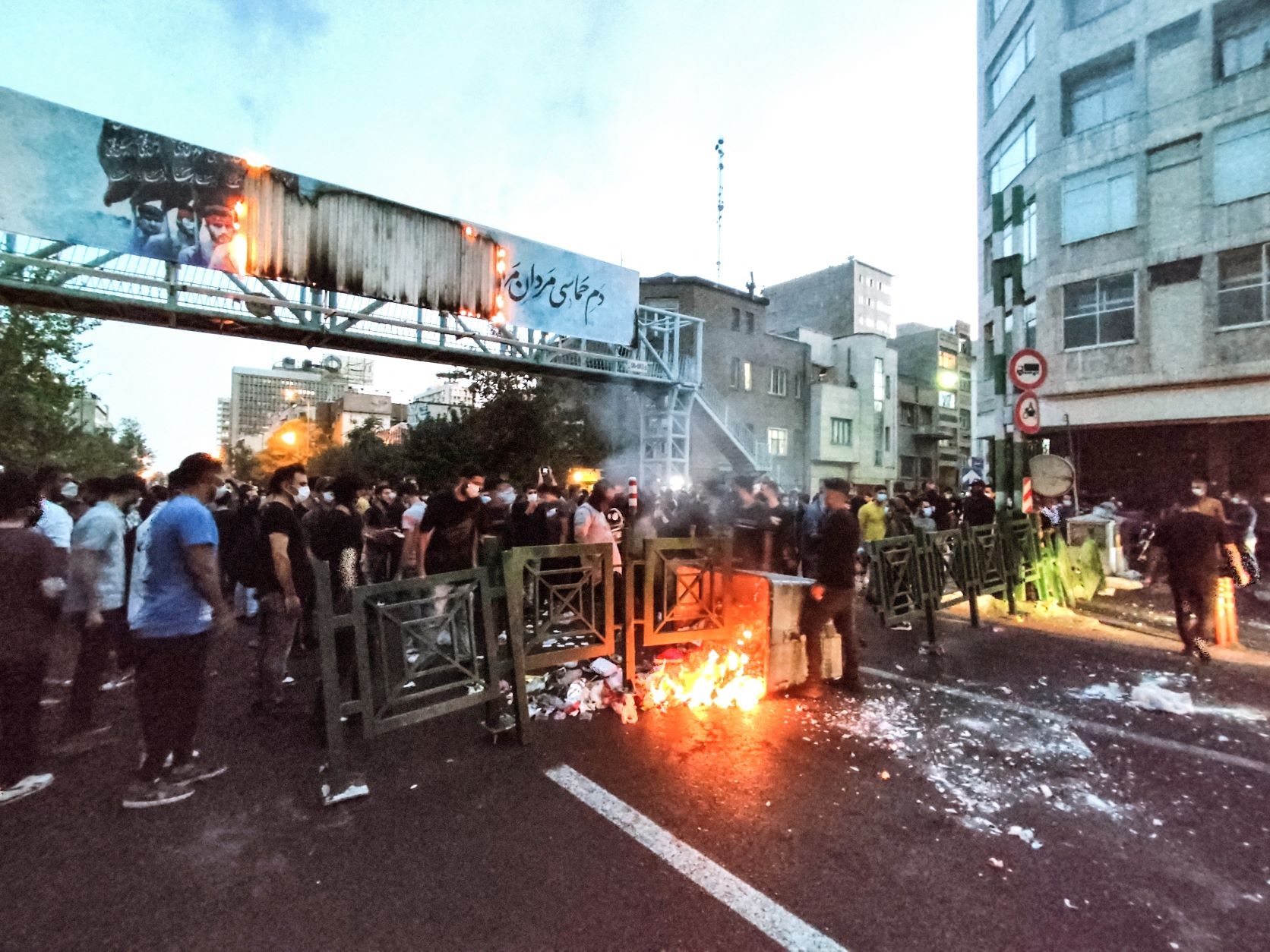Mahsa Amini: Iran shuts down internet as death toll from 'bad hijab' protests rises

The Iranian government cut off internet access across the country on Wednesday evening as the death toll during protests against the death of Mahsa Amini reportedly rose to at least 11.
Demonstrations have grown across the country as anger mounts at the law imposing headscarves on women and the "morality police" used to enforce it.
Videos have shown women burning headscarves and protesters brawling with police. Seven protesters have been killed, according to Iranian officials, though others have suggested the figure is higher.
Amini, a 22-year-old Kurdish woman, died in hospital after being arrested in Tehran last week by the special police unit that monitors women's clothing and looks out for "bad hijab".
Stay informed with MEE's newsletters
Sign up to get the latest alerts, insights and analysis, starting with Turkey Unpacked
Tehran police said in a statement on Thursday that, while in custody, Amini had "suddenly suffered from a heart problem" and was "immediately taken to hospital". On Friday it was announced that she had died there.
While the police said there had been no "physical contact" between Amini and the officers, campaigners and family members said she had been tortured while in custody. Prominent lawyer Saeed Dehghan said Amini had received fractures to her skull and described her death as "murder".
State media reported that street rallies had spread to 15 cities by Wednesday.
Police fired tear gas on crowds and made arrests, while videos appeared to show them beating demonstrators with clubs and firing live ammunition.
Activists have chanted "death to the dictator" and the Kurdish slogan "women, life, freedom" while clashing with security forces.
Internet block
On Wednesday, in an apparent bid to clamp down on the protesters, Iranians were cut off from the internet.
First Instagram was blocked, then WhatsApp. At around 10 pm, the local internet, known as National Internet, replaced the global internet, which meant Iranians could only access locally-based servers.
"In such a situation, the internet is shut down to prevent people from communicating with each other - this is not a new thing and the regime has used this dirty method to suppress protests," a political journalist in Bushehr, in southern Iran, told Middle East Eye anonymously.
'It is very difficult because my daughter is worried about me in France and I am also worried here that I cannot tell her about myself'
- Iranian mother
"This move even disrupts the process of sending videos, photos, and news from Iran to the world."
The closure of the internet has increased anxiety among many activists and relatives who fear a prelude to an even fiercer crackdown.
"In a situation where every family has at least one child outside of Iran these days, cutting off the internet makes families unable to be aware of each other," a 51-year-old woman in Tehran told MEE.
"It is very difficult because my daughter is worried about me in France and I am also worried here that I cannot tell her about myself."
The Iranian government has made some attempts to try and quell anger over the death of Amini.
President Ebrahim Raisi, who since his election last year has tightened enforcement of the headscarf law, reportedly spoke with Amini's family by phone on Sunday.
"Your daughter is like my own daughter, and I feel that this incident happened to one of my loved ones. Please accept my condolences," state media reported him as saying.
According to Iranian media, four members of the security forces have died so far.
The reports said three militia members were stabbed or shot after being "mobilised to deal with rioters" in Mashhad in the northeast, Qazvin in the centre, and Tabriz in the northwest. A fourth member of the security forces was also reportedly killed in the southern city of Shiraz.
'Basic rights'
In an address to the UN General Assembly, US President Joe Biden said he stood in solidarity with Iranian women.
"Today we stand with the brave citizens and the brave women of Iran who right now are demonstrating to secure their basic rights," Biden told the assembly.
A number of other foreign officials also called on Iran to respond to the demonstrations.
British Foreign Secretary James Cleverly said that "the Iranian leadership should notice that the people are unhappy with the direction that they have taken," while French President Emmanuel Macron said he asked Raisi in a meeting on Tuesday to show "respect for women's rights".
The sheer scale of the protests is unprecedented since the 1979 revolution that eventually saw the Islamic Republic brought to power.
In 2019, more than 300 protesters and bystanders were killed by authorities during anti-government demonstrations, according to rights groups.
While previous demonstations have focused on widespread poverty, corruption, and unemployment - problems exacerbated by US-imposed sanctions - the death of Amiri has also managed to galvanise a reaction from all sections of society.
"I’m seeing women who are never even political or neutral about the hijab disturbed by what happened to Mahsa because it could have happened to literally anyone," Mahsa Alimardani, an internet researcher focusing on freedom of expression and access to information online in Iran, told MEE.
"I am seeing calls to remove the mandatory hijab and disband the morality police en masse. There has never been a more unanimous call for removing this infrastructure and law for enforcing mandatory hijab."
Middle East Eye delivers independent and unrivalled coverage and analysis of the Middle East, North Africa and beyond. To learn more about republishing this content and the associated fees, please fill out this form. More about MEE can be found here.





